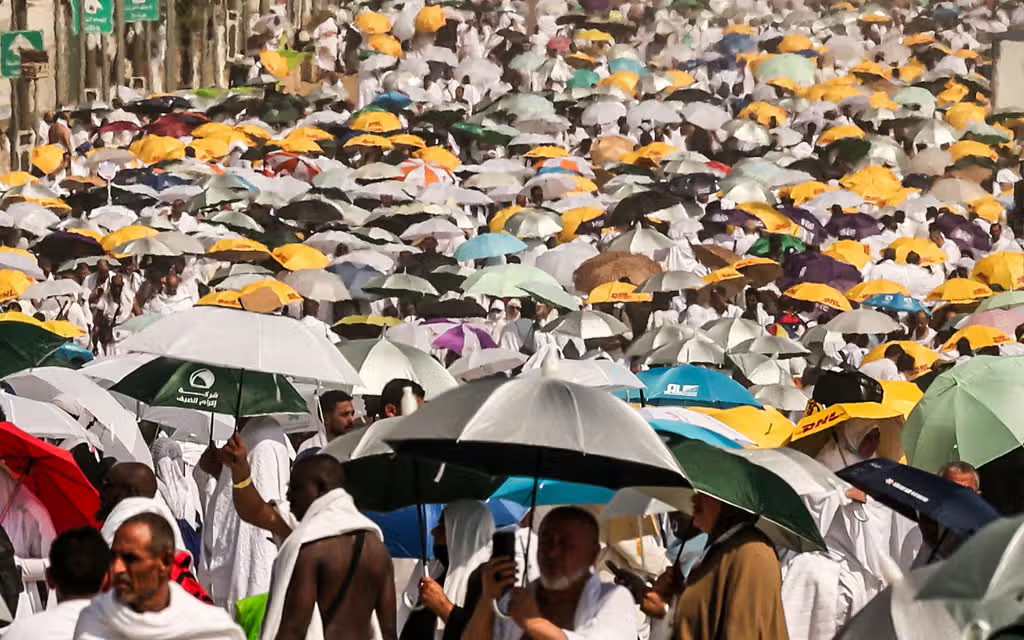

Last week, I warned against the dangers of overpacking and painted an accurate picture of what to expect, loo-wise, should you choose to embark on that holiest of journeys: Hajj.
Loos notwithstanding, our pilgrimage was as spiritually restorative as promised, with the bonus of new friendships that can only spring up when you have to spend the next twenty-four hours with someone in a tent, united against the women at the other end complaining that the AC is too cold.
Today, I am back with more tips. From keeping your phone charged to knowing just what not to do outside Haram, here are some clear-cut dos and don'ts so you don’t fall into the same trap I did.
Do: Plan your trip at least six months in advance. This timeframe will allow you time to sort out logistics, such as pondering aloud, “Perhaps now would be a good time to check when my passport expires.”
Don’t: Decide to go six weeks before Hajj begins, and then discover your passport is on the verge of running out. This will mean liaising with a government website that promises an urgent passport, defining ‘urgent’ as ‘four weeks’. This course of action is only for those who relish self-torment via a cortisol spike.
Do: Go with a small-ish operator. A large operator with enough customers to fill forty buses will not care if you are waiting for your ‘urgent’ passport. A small operator desperate for your business will swear to you that he knows a guy in Nadra who can expedite your ‘urgent’ passport, and - this is the true miracle of Hajj - he really will know a guy, and the guy really can expedite your passport.
Do: Buy comfortable shoes. You are going to be walking whether you like it or not. When the roads are closed to traffic and the nearest taxi is an hour away, you are not going to be sunbathing on the pavement. You will be walking, because that is the only way you will get one step closer to leaving behind the dystopian outdoors. Last year’s trainers where the laces mysteriously untie every five minutes are not going to cut it.
Don’t: Leave your new shoes unattended. Leaving shoes outside Haram, for example, is like tossing an impala to a pride of lions at dinnertime. Carry around a drawstring bag to sling your shoes in so they are never out of your sight. Guard them the way you would your biological child or beloved pet.
Do: Use industrial-grade sunblock, a cap, and sunglasses. To be without them would be just as foolish as visiting the South Pole wearing a sweatshirt for warmth.
Do: Bring electrolytes to mix into your water bottle. In that baking heat, water alone is as effective as mopping your house with a wet tissue.
Do: Place yourself strategically in front of the AC when you enter your tent. If you don’t like being cold, go away to the back of the tent. Do not sit near the AC and then force the AC guy to turn it up to 24C. This will make people want to throw a shoe at you.
Don’t: leave your charger at your hotel when you get to Mina, or decide to be a devout pilgrim whose Hajj will only be accepted if you are offline. You cannot complete Hajj without a decent amount of battery and a good data package unless you want to spend the next week wandering around Makkah like a lost sheep. Your Hajj operator will communicate via WhatsApp, and if you have an aversion to voice notes, this is the time to steel yourself, because Hajj operators adore voice notes, and will use little else to broadcast their extremely specific instructions, such as where to meet for the bus, which roads are closed, and what time dinner is served.
Do: take a power bank. And when you find yourself in a tent full of people who can't find a working socket, you can either embrace the spirit of pilgrimage and share your power bank amongst your new tent friends, or you can hide both it and your (charging) phone in your backpack. This may go against the spirit of pilgrimage, but the alternative is getting lost on the roads without Google Maps as you walk for two hours. I will not publicly confirm which course of action I took.
Don’t: harbour the happy delusion that all that walking will mean you will come back home two dress sizes smaller. Our operator provided three meals a day and unlimited ice cream. And those meals, by the way, were not a cheese sandwich and a banana. The meals were biryani, pulao, chicken karahi, bhindi, daal, chawal, karhi, achar, aloo matar, and Lord only knows what else. If all those road closures didn’t force you to walk, you’d come home two sizes heavier.
Do: assume that your fellow people during Tawaf are terrible drivers. Right at the moment of completion of their final circuit, they will attempt to bulldoze from the extreme left to the extreme right at an ambitious 90-degree angle. These are the same people whose driving repertoire includes turning right from the left lane. No amount of tutting and sighing praying for divine intervention to set them straight is going to work here. You will be shoved, your feet will be trampled on, and you will, as sure as the sun will rise, be coughed on. After my ten days away, I can only conclude that those who embark on Hajj consider it a divine obligation to cough directly in the face of their fellow pilgrims. They aim for it like an Olympian archer. It is part of the package.
Finally, if you get on that plane at Jeddah and have miraculously remained bug-free during your time in Saudi Arabia, do not congratulate yourself just yet. Your fellow Hajj-goers tried so hard to spread their germs far and wide, and their efforts will not have gone in vain. Keep your medicine cabinet stocked. It will be raided upon your return.
Have something to add to the story? Share it in the comments below.




_updates-0.jpg)







